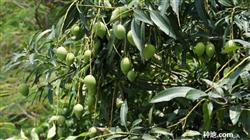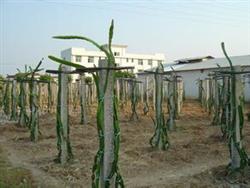How to irrigate and drain dragon fruit scientifically
Soil water status is closely related to tree development, high yield, stable yield and tree life. It is an important task of orchard soil management to keep soil moisture condition in a range conducive to the growth and development of fruit trees through irrigation and drainage. 1. Irrigation is the lifeblood of plant growth and an indispensable component of all organ activities. In the life activities of fruit trees, water plays a role in maintaining cell swelling and pressure, ensuring stomatal opening and carbon dioxide entry. All chemical changes in the body can only be carried out in the presence of water. The nutrients in the soil can only be absorbed and utilized when they are dissolved in water. More importantly, water is the necessary raw material for photosynthesis and the basis for the formation of yield. In addition, only under the condition of water can we maintain the transpiration of fruit trees, adjust the tree temperature, and ensure the transport of photosynthates and mineral nutrients. Therefore, in the cultivation of fruit trees, timely watering is an important measure to ensure premature, high yield and high quality. The main results are as follows: (1) Irrigation during irrigation period should be done before the fruit trees are affected by water shortage, and should not be watered again when the fruit trees have already had drought (such as wilting, fruit shrinkage). Judging whether it needs watering or not mainly depends on the soil moisture. Generally speaking, 60%-80% of the maximum soil water holding capacity is the most suitable for the growth and development of fruit trees. Dragon fruit grows in desert areas for a long time and has a strong tolerance for water shortage. In foreign countries, measuring instruments are generally used to measure soil moisture to guide irrigation. The irrigation period is determined not only according to the soil moisture, but also the climatic conditions and the growth and development stage of the fruit tree itself. In production, most of them are watered in the following periods. If there is enough water in the soil before and after germination to flowering stage of ①, it can strengthen the growth of new shoots, increase leaf area, enhance photosynthesis, make flowering and fruit setting normal, and lay the foundation for high yield in the same year. In spring drought areas, this irrigation is particularly important. The period of ② shoot growth and young fruit expansion is often called the critical period of water requirement of fruit trees. At this time, the physiological function of the fruit tree is the most prosperous, such as the lack of water, the leaves take away the moisture of the young fruit, making the young fruit shrink and fall off. During the rapid expansion period of ③ fruit, this watering can meet the requirements of fertilizer and water for fruit expansion. But it is necessary to master the amount of water this time. ④ fruit harvesting and dormant period are in the autumn and winter arid areas. Irrigation at this time can store enough water in the soil and contribute to the decomposition of fertilizers, thus promoting the growth and development of fruit trees in the next spring. After the last batch of dragon fruit is harvested in autumn and winter, it enters the dormant period, at this time, if there is proper irrigation, it can promote the growth of the plant and promote the branches to become fruiting branches as soon as possible. (2) Irrigation method and irrigation quantity ① flooding irrigation is often carried out in the area with abundant water sources and flat terrain. However, this method has a certain degree of damage to the soil structure, labor-consuming and time-consuming, and uneconomical, so it has been gradually reduced. ② border irrigation repairs the tree plate on a plant-by-plant basis, or forms a long border along the tree line, and diverts water into the tree plate or border when irrigation. This method saves water, is easy to manage, and is widely used. However, it will also damage the soil structure of the tree bed, resulting in the death of absorbing roots. ③ hole irrigation when there is a lack of water source, 12 holes with a diameter of about 30 cm can be opened at the outer edge of the crown drip line. The depth of the hole is appropriate not to hurt the root. Water is injected into the hole and filled after infiltration. ④ furrow irrigation ditches are opened at a certain distance between two rows of trees, with a depth of 20ml 30cm and a width of about 50cm. Generally open 2 per row, dwarf dense planting garden can also open one, the water into the ditch, gradually infiltrate into the soil. This method not only saves water, but also destroys soil structure less, so it should be advocated. ⑤ drip irrigation is an advanced irrigation technology of mechanization and automation developed in recent years. It is an irrigation method that is slowly applied to plant roots with water droplets or small water flow. Now it is gradually adopted in production. Drip irrigation has many advantages: for example, drip irrigation only moistens the soil layer and topsoil near the roots of crops, greatly reducing water evaporation; this system can be fully automated and minimize labor. Moreover, it can often supply water to the soil in the root zone, maintain the soil moist evenly, make it not too moist and too dry, and keep the soil in the root zone well ventilated at the same time, such as drip irrigation combined with fertilization, it can continuously supply root nutrients, which is most conducive to the growth and development of fruit trees and kill two birds with one stone. According to foreign reports, drip irrigation can increase the yield of fruit trees by 20% to 50%. However, the drip irrigation system needs more pipes, a large investment, a water tower and filtration system with a certain pressure, and the introduction of water into the main and branch pipes of the orchard, as well as the capillaries and emitters around the tree. And pipes and emitters are easy to clog, strict requirements of good filtration equipment. No matter which irrigation method is adopted, the amount of primary irrigation should not be too large or too little, and it is appropriate to soak through the soil of the main root distribution layer. In order to determine the amount of irrigation, the soil quality, the growth and development period of fruit trees, fertilization and meteorological conditions should be taken into account. It is generally believed that the minimum irrigation capacity is 60% of the maximum soil moisture capacity, and the ideal water capacity is 80% of the maximum water holding capacity. In addition, according to the long-term experience of fruit growers and technicians, it is considered that the irrigation is thoroughly, which is actually the most suitable amount of irrigation. two。 Drained dragon fruit root is most afraid of hypoxia, avoid stagnant water, soil moisture is too much, air permeability is weakened, hinder root respiration, serious will make the active part suffocate to death, cause fruit drop, reduce fruit flavor, 'and even cause plant death. Therefore, in addition to water conservation and timely irrigation, we should also do a good job in flood control and other drainage work, build drainage ditches and floodways, and prepare for flood control and drainage in rainy seasons. The number and size of drainage ditches in the orchard should be determined according to the local rainfall, the strength of soil water retention and the level of groundwater level. In general, the drainage ditch in the dragon fruit orchard is about 1 meter deep. Click to see more dragon fruit planting techniques
- Prev

How about big mangoes? how about flowers and fruits?
How about big mangoes? how about flowers and fruits? The flowering and fruit setting period of big mango is a very important period in mango production and management. the management measures of flowering and fruit setting period are as follows: 1. Arrangement of flowering branches and shoots. Remove dense branches, weak shade branches and disease and insect branches about 2 months before flower bud differentiation, leaving only each branch.
- Next

Introduction to the planting experience and technology of dragon fruit
Meixian County is the famous hometown of golden pomelo, but the dragon fruit is rarely planted in this area, and the price is high in the market. The development of dragon fruit cultivation has great potential, which is conducive to change the planting structure and increase the income of farmers. A peasant household in Bingcun Town, Meixian County planted 5 mu of dragon fruit on a trial basis in 2003, and it grew very well.
Related
- Moge, come on! The staff of the peasant association in the producing area of cantaloupe were frightened when the crowd gathered.
- Causes and Solutions of low Fruit setting rate of Apple
- Symptoms and control measures of passion fruit virus disease
- Fruit growing lesson: how do apple orchards keep high yields?
- Can you build orchards in the mountains? What are the pros and cons?
- How to manage the coloring period of Crisson grape?
- This paper introduces the processing technology of two kinds of fig products.
- How much is a month for retired teachers in rural areas by 2020?
- How can strawberry planting increase sugar content? We should pay attention to management in many aspects.
- What are the cultivation techniques on how to improve the yield of golden fruit?

